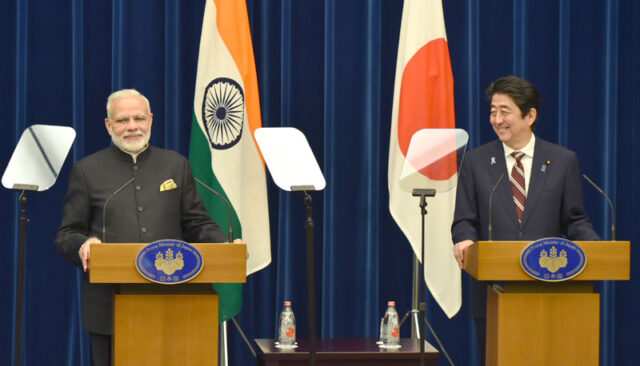NEW DELHI: Three years after it was launched by Prime Minister Narendra Modi, the Asia-Africa Growth Corridor is yet to get off the ground. The corridor was touted as the rival to China’s mega trans-continental Belt and Road Initiative (BRI), so the lack of movement is disappointing.
“There has been some stalemate in the process… but it has certainly not stopped. Work is still on,” a source told StratNews Global, acknowledging that “it appears to have lost some priority in the governments (India and Japan).”
The corridor was outlined as Modi’s and then Japanese Prime Minister Shinzo Abe’s vision of collaboration in Africa, during their annual bilateral summit in Tokyo in November 2016. In May the following year, Modi made a pitch for developing the Asia-Africa Growth Corridor at the annual meeting of the African Development Bank in Gandhinagar. The Indian and Japanese governments presented the vision document of the corridor project at that event.
This was days after China had hosted a Belt and Road Summit meeting in Beijing with nearly 30 countries participating. India has declined to join the BRI, despite Beijing’s constant exhortations, saying the Chinese initiative does not respect India’s concerns of sovereignty and territorial integrity, while Japan has toyed with the idea of BRI but not joined it so far.
The corridor was projected to focus on development and cooperation projects, building quality infrastructure and connectivity, skill enhancement and building people-to-people links. This was also intended to bring Asia and Africa closer but while the Track-I process (between the governments) appears not to have moved forward after the Gandhinagar announcement, the Track-II process (between the think tanks) has been going on. From India, the Research and Information System for Developing Countries (RIS) participated while the Economic Research Institute for ASEAN and East Asia (ERIA) and the Institute of Developing Economies–Japan External Trade Organization (IDE-JETRO) are the other think-tanks involved.
Officials of the two countries involved in the corridor project met once in 2018 but after that there was no further conversation. Possibly Japan’s change in leadership—Abe stepping down due to ill health last year and the mantle passing on to Yoshihide Suga— was a reason, the source suggested. Add to that the Covid-19 pandemic. The corridor did not come up during the India-Japan bilateral in 2017 nor during the “summit telephone talk” in September last year. In fact, the two sides have taken forward the India-Japan Act East Forum, launched in 2017, with the fifth meeting held in January this year. The Act East Forum is a platform for India-Japan collaboration in the North Eastern Region under India’s ‘Act East Policy’ and Japan’s vision for a ‘Free and Open Indo-Pacific’.
The corridor is seen as a perfect blending of Japan’s ‘Free and Open Indo-Pacific’ vision outlined by Abe and India’s SAGAR doctrine outlined by Prime Minister Modi in a speech in Singapore in 2018. “With the Indo-Pacific strategy gaining currency in recent times, the corridor could help realise the economic agenda of the region. The corridor can be leveraged to achieve the goals of an open, free and inclusive Indo-Pacific,” the source said.
For India, development partnership has been the cornerstone of its involvement in projects in Africa, ranging from infrastructure building to capacity building and training under the Indian Technical and Economic Cooperation (ITEC) programme, providing concessional credit, among others, which is “demand driven and free of conditionalities”. So how would the corridor be different from the work India has been doing for decades in Africa under its Development Partnership initiative?
“While under the development partnership initiative, the projects are handled in silos (individually), under the corridor it would be integrated. From building a port, to a road from it leading to the nearest SEZ, employing locals and enhancing their capacity building and training—all would come under one umbrella,” the source pointed out.
The collaboration in Africa is not limited to Japan, other Asian countries could also join in, said the source. Indonesia had evinced interest in joining the corridor and “is still looking forward” to becoming part of it, the source added. Asia and Africa together represent 70 per cent of the global population and 37 per cent of global GDP. China has reportedly invested in 52 out of the 54 African countries under the BRI while the African Union has also signed a Memorandum of Understanding on BRI cooperation. But given reports that BRI projects have been hit by the Covid economic slowdown, the time may have come for India and Japan to seize the initiative and push forward with the corridor project.
(The author is a senior journalist on the foreign policy beat. Views expressed in this article are personal.)





